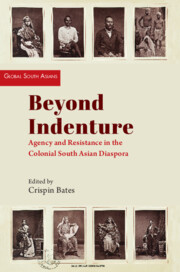Book contents
- Frontmatter
- Dedication
- Contents
- List of Figures and Tables
- Acknowledgements
- Introduction
- I Agency and Resistance
- 1 Negotiating Power in Colonial Natal: Indentured Migrants in Natal, 1860–1911
- 2 Stewed Plums, Baked Porridge and Flavoured Tea: Poisoning by Indian Domestic Servants in Colonial Natal
- 3 Labour Resistance in Indenture Plantations in the Assam Valley
- 4 A Forgotten Narrative of the Satyagraha Campaign: The Treatment of Prisoners between 1907 and 1914
- 5 Toilers across the Seas: Racial Discrimination and Political Assertion among Sikhs in Canada
- II Remigration
- 6 The Remigration of Hindostanis from Surinam to India, 1878–1921
- 7 Not So Anchored: The Remigration of Indians within the Caribbean Region
- 8 On the Move: Remigration in the Indian Ocean, 1850–1906
- III Gender and Family
- 9 Intimate Lives on Rubber Plantations: The Textures of Indian Coolie Relations in British Malaya
- 10 Labouring under the Law: Exploring the Agency of Indian Women under Indenture in Colonial Natal, 1860–1911
- 11 Gujarati ‘Passenger Indians’ in the Eastern Cape since 1900: Business, Mobility, Caste and Community
- 12 The Eurasian Female Workforce and Imperial Britain: Harnessing Domestic Labour by People of Mixed Racial Descent
- IV Legacies
- 13 After the Long March: Colonial-Era ‘Relief’ for Burma Indian Evacuees in Visakhapatnam District, 1942–1948
- 14 Opposing the Group Areas Act and Resisting Forced Displacement in Durban, South Africa
- 15 Indo-Fijians: From Agency to Abjection
- 16 New and Old Diasporas of South South Asia: Sri Lanka and Cyber-Nationalism in Malaysia
- About the Contributors
- Index
11 - Gujarati ‘Passenger Indians’ in the Eastern Cape since 1900: Business, Mobility, Caste and Community
Published online by Cambridge University Press: 31 December 2023
- Frontmatter
- Dedication
- Contents
- List of Figures and Tables
- Acknowledgements
- Introduction
- I Agency and Resistance
- 1 Negotiating Power in Colonial Natal: Indentured Migrants in Natal, 1860–1911
- 2 Stewed Plums, Baked Porridge and Flavoured Tea: Poisoning by Indian Domestic Servants in Colonial Natal
- 3 Labour Resistance in Indenture Plantations in the Assam Valley
- 4 A Forgotten Narrative of the Satyagraha Campaign: The Treatment of Prisoners between 1907 and 1914
- 5 Toilers across the Seas: Racial Discrimination and Political Assertion among Sikhs in Canada
- II Remigration
- 6 The Remigration of Hindostanis from Surinam to India, 1878–1921
- 7 Not So Anchored: The Remigration of Indians within the Caribbean Region
- 8 On the Move: Remigration in the Indian Ocean, 1850–1906
- III Gender and Family
- 9 Intimate Lives on Rubber Plantations: The Textures of Indian Coolie Relations in British Malaya
- 10 Labouring under the Law: Exploring the Agency of Indian Women under Indenture in Colonial Natal, 1860–1911
- 11 Gujarati ‘Passenger Indians’ in the Eastern Cape since 1900: Business, Mobility, Caste and Community
- 12 The Eurasian Female Workforce and Imperial Britain: Harnessing Domestic Labour by People of Mixed Racial Descent
- IV Legacies
- 13 After the Long March: Colonial-Era ‘Relief’ for Burma Indian Evacuees in Visakhapatnam District, 1942–1948
- 14 Opposing the Group Areas Act and Resisting Forced Displacement in Durban, South Africa
- 15 Indo-Fijians: From Agency to Abjection
- 16 New and Old Diasporas of South South Asia: Sri Lanka and Cyber-Nationalism in Malaysia
- About the Contributors
- Index
Summary
This sociological and anthropological study of the Mochi, or Kshatriya, caste-based community living in Port Elizabeth, South Africa, contributes to the dearth of literature on this sub-ethnic grouping globally and to the existing historical studies on Gujaratis in South Africa. The chapter discusses the social and financial mobility of a Mochi community that immigrated to South Africa primarily to improve their lives and escape a hierarchical caste system that predetermined their status and occupations in society.
Migrants and their descendants in South Africa sought to attain financial security through establishing caste-based businesses and other entrepreneurial initiatives. Narratives of prosperous Gujarati entrepreneurs are widely available, often contributing to misplaced stereotypical notions of affluence and Gujaratis being ‘inherently entrepreneurial’. Dharam P. and Yash P. Ghai, in their article ‘Asians in East Africa: Problems and Prospects’, explain that Asians have had a monopoly of both wholesale and retail trade, especially in Uganda and Tanganyika (present-day Tanzania), and both Asian businesses and industrialists are responsible for a substantial amount of investment within East Africa. Roli and Daya R. Varma have indicated that the ‘entrepreneurial capacity of the Indian immigrants in the United States is notable’, with up to 15 per cent of the technology businesses being Indian-owned after the 1990s. In a more recent publication titled Settled Strangers: Asian Business Elites in East Africa (1800–1900), Gijsbert Oonk discusses the entrepreneurial success of these Asian business migrants in new homelands and circumstances after migration to East Africa. Similarly, Manan Dwivedi considers Gujarati migrants and their entrepreneurial and trading skills that have contributed significantly to these migrants being respected as successful businessmen globally in his paper ‘Global Platform: Perceptions, Contributions and Experiences’.
The perception that prevails is that most Gujaratis are successful in business, irrespective of locality. Recent media reports available also adhere to this belief. An online news portal, India TV News, published a report revealing the top ten Gujarati businessmen in India and discussed their ability to achieve astronomically high profit margins during financially challenging periods. The tone of the article, however, feeds into a widespread generalisation concerning the alleged inherent spirit of entrepreneurship among Gujaratis. Although this chapter is not an endorsement of this perception, it does, however, concentrate upon a little-known community of Gujarati shoemaker entrepreneurs in South Africa’s Eastern Cape province.
- Type
- Chapter
- Information
- Beyond IndentureAgency and Resistance in the Colonial South Asian Diaspora, pp. 240 - 261Publisher: Cambridge University PressPrint publication year: 2024



